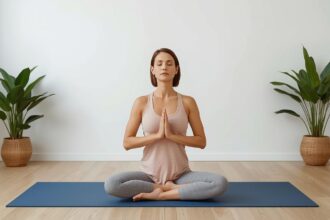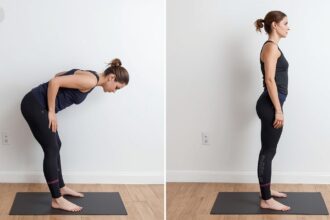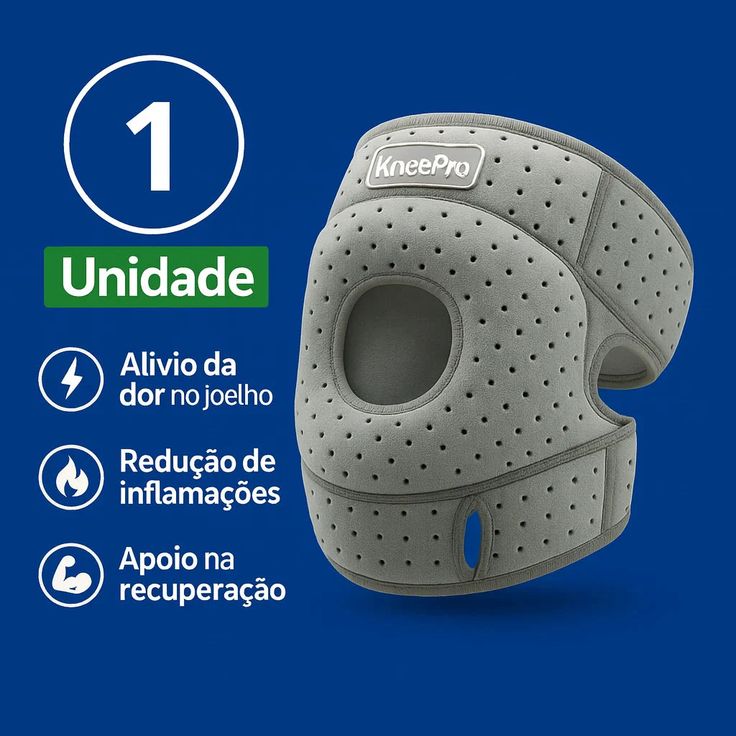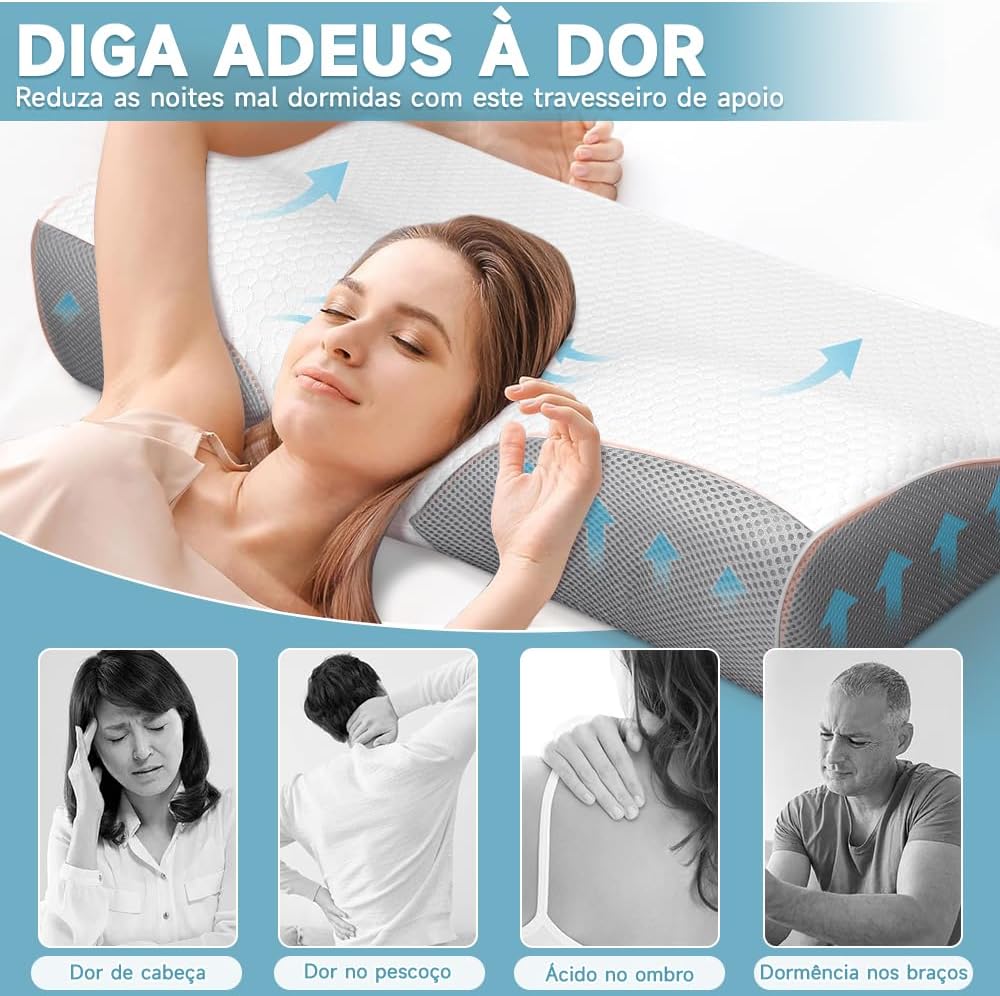técnicas efizes para enfrentar a ansiedade, A ansiedade é algo com que muitos de nós lidamos, muitas vezes silenciosamente. Ela se infiltra em nossos pensamentos, afeta nosso humor e pode até mesmo prejudicar nossa saúde física. Mas a boa notícia? Existem maneiras de lidar com isso.
Seja entendendo de onde ela vem, aprendendo a lidar ou fazendo mudanças no estilo de vida, há esperança para todos que buscam assumir o controle de sua ansiedade. Vamos explorar algumas dicas e estratégias práticas que podem realmente fazer a diferença.
Principais Pontos
- Anxiety often stems from overthinking the past or worrying about the future.
- Practicing mindfulness can help you stay grounded in the present moment.
- Simple breathing exercises can calm your mind and ease physical tension.
- Negative thought patterns can make anxiety worse, but they can be replaced with constructive ones.
- Lifestyle habits like good sleep, balanced nutrition, and regular exercise play a big role in reducing anxiety.
Understanding the Roots of Ansiedade
How Ansiedade Manifests in Daily Life
A ansiedade pode se infiltrar na vida cotidiana de maneiras que você nem percebe. Pode ser aquela sensação de inquietação quando você está preso no trânsito, ou a maneira como sua mente corre à noite repetindo conversas.
Para alguns, ela aparece como perfeccionismo sempre precisando fazer as coisas da maneira certa — ou procrastinação, evitando tarefas completamente porque elas parecem opressivas. É como se seu cérebro estivesse preso em um loop, sempre se preparando para algo que pode nem acontecer.
- Constantly feeling “on edge” or irritable
- Difficulty concentrating on simple tasks
- Feeling physically tense, like your muscles are always tight
The Role of Past and Future in Fueling Ansiedade
Our minds love to time travel, but this can be a big problem when it comes to ansiedade. Dwelling on past mistakes or worrying about future “what-ifs” pulls you away from the present moment. That mental tug-of-war often leaves you feeling powerless and stuck.
- Obsessing over “what could have been” in the past
- Catastrophizing about future events that may never occur
- Losing sight of what’s happening right now
Letting go of the past and not fearing the future is easier said than done, but it’s the only way to reclaim your peace.
Recognizing the Physical and Emotional Signs
Ansiedade doesn’t just live in your head—it takes a toll on your body, too. You might notice your heart racing, your stomach churning, or even random aches and pains. Emotionally, it can feel like a rollercoaster you can’t get off.
- Physical signs: rapid heartbeat, sweating, upset stomach
- Emotional signs: irritability, feelings of dread, or constant worry
- Behavioral signs: avoiding situations or people that might “trigger” you
Taking the time to recognize these signs is the first step toward managing them.
Practical Strategies to Manage Ansiedade
The Power of Mindfulness and Staying Present
Mindfulness is all about focusing on the present moment. It’s simple but not always easy. Start by paying attention to your breathing or the sensations in your body. When your mind drifts to worries about the future or regrets about the past, gently bring it back. This practice can help anchor you, reducing feelings of being overwhelmed.
Practical steps to try mindfulness:
- Spend 5 minutes each morning observing your breath.
- Try a body scan meditation to notice tension in your muscles.
- Use grounding techniques, like naming five things you can see or hear around you.
Using Cognitive Reframing to Shift Perspectives
Cognitive reframing means changing how you interpret situations. For instance, instead of thinking, “I’ll fail this presentation,” reframe it to, “This is a chance to share my ideas.” This shift can reduce the grip of anxiety by making challenges feel more manageable.
Here’s a quick guide:
- Identify the negative thought.
- Ask yourself if it’s entirely true or if you’re exaggerating.
- Replace it with a balanced, constructive perspective.
The Importance of Breathing Techniques
Breathing exercises are a fast way to calm anxiety. When you’re anxious, your breathing tends to get shallow. Slowing it down can signal your body to relax. Try this simple method:
| Technique | Steps |
|---|---|
| 4-7-8 Breathing | Inhale for 4 seconds, hold for 7, exhale for 8. Repeat 4 times. |
| Box Breathing | Inhale for 4 seconds, hold for 4, exhale for 4, hold for 4. Repeat. |
| Diaphragmatic | Breathe deeply into your belly. Place a hand on your stomach to feel it rise. |
técnicas efizes para enfrentar a ansiedade
“Focusing on your breath doesn’t just calm your mind—it gives you a sense of control during anxious moments.”
The Connection Between Thoughts and Ansiedade

técnicas efizes para enfrentar a ansiedade
How Negative Thinking Patterns Amplify Ansiedade
Negative thinking can feel like a spiral—one small worry snowballs into a massive storm of “what-ifs.” Our minds often exaggerate fears, creating scenarios that may never happen. For example:
- A single mistake at work might lead to thoughts like, “I’m going to lose my job.”
- A delayed text reply turns into, “They must be mad at me.”
- Feeling tired could spiral into, “What if I’m seriously ill?”
These patterns feed ansiedade, making it hard to focus or relax. The key is catching these thoughts early and questioning their validity.
Breaking the Cycle of Catastrophic Thinking
Catastrophic thinking is when your brain jumps to the worst-case scenario. It’s exhausting and rarely helpful. To break this cycle:
- Pause and breathe. When you notice your mind racing, stop and take deep breaths.
- Ask yourself questions. Is this thought based on facts or feelings? What’s the most likely outcome?
- Challenge the thought. Replace “I can’t handle this” with “I’ve faced challenges before and managed.”
Over time, this practice can weaken the hold of catastrophic thoughts.
Replacing Fearful Thoughts with Constructive Ones
Instead of letting fear take over, try shifting your mindset to something more productive. If a thought like “I’ll fail at this” pops up, counter it with, “I’ll do my best, and that’s enough.” Here’s a simple table to guide you:
| Fearful Thought | Constructive Replacement |
|---|---|
| “I’m not good enough.” | “I’m learning and improving.” |
| “Everything will go wrong.” | “I’ll handle things step by step.” |
| “I can’t do this.” | “I’ll try, and that’s progress.” |
técnicas efizes para enfrentar a ansiedade
By actively replacing negativity with constructive thoughts, you can reduce the grip ansiedade has on your daily life.
Practicing these strategies may not feel natural at first, but with time, they can help you regain control over your thoughts and emotions.
Building Emotional Resilience Against Ansiedade
The Role of Self-Compassion in Reducing Ansiedade
Sometimes, we are our own toughest critics. You might find yourself replaying mistakes or worrying about things you can’t control. Self-compassion can be a game-changer. It’s about treating yourself with the same kindness you’d offer a close friend. When anxiety strikes, remind yourself: “It’s okay to feel this way. I’m doing the best I can.”
Here are ways to practice self-compassion:
- Write down three things you appreciate about yourself every day.
- Avoid comparing yourself to others—it’s not a competition.
- When you stumble, pause and say, “What can I learn from this?”
Learning to Embrace Uncertainty
Let’s face it—life is unpredictable. Trying to control every little thing? It’s exhausting and often impossible. Instead, consider leaning into uncertainty. It’s not about giving up; it’s about accepting that some things are out of your hands. This mindset can free you from unnecessary stress.
Practical steps to embrace uncertainty:
- Focus on what you can control, like your attitude or daily habits.
- Practice gratitude—it shifts your attention to the good things in your life.
- Challenge the “what ifs” by asking, “What’s the worst that can really happen?”
Accepting uncertainty doesn’t mean you’re powerless. It means you’re flexible and open to whatever comes your way.
Developing Healthy Coping Mechanisms
Quando a ansiedade se instala, é tentador recorrer a soluções rápidas rolar a tela sem parar no seu telefone, comer demais ou evitar responsabilidades. Embora isso possa distraí-lo temporariamente, muitas vezes faz com que você se sinta pior. Construir mecanismos de enfrentamento saudáveis leva tempo, mas vale a pena.
Here’s a list of healthier options:
- Exercise, even if it’s just a 10-minute walk.
- Journaling your thoughts to get them out of your head.
- Talking to someone you trust about how you’re feeling.
Small changes can add up. Pick one strategy to try this week and notice how it impacts your anxiety levels.
Lifestyle Changes to Alleviate Ansiedade
The Impact of Nutrition and Exercise on Mental Health
O que você come e como você movimenta seu corpo pode ter um efeito enorme em sua saúde mental. Uma dieta balanceada rica em alimentos integrais, como frutas, vegetais e proteínas magras, apoia a função cerebral e reduz os níveis de estresse.
Por outro lado, muita cafeína, açúcar ou alimentos processados podem piorar a ansiedade. O exercício é outro divisor de águas. A atividade física regular libera endorfinas, que são elevadores naturais do humor. Até mesmo uma caminhada de 20 minutos pode fazer a diferença. Se você não gosta de academias, experimente ioga ou dança qualquer coisa que faça você se movimentar.
Creating a Balanced Routine to Reduce Stress
Ter uma rotina diária previsível pode trazer uma sensação de estabilidade. Comece definindo limites claros entre o trabalho e o tempo pessoal. Abra espaço para hobbies, relaxamento e socialização. Não se comprometa demais aprender a dizer não pode ser um salva-vidas.
Uma boa regra prática é planejar seu dia na noite anterior, focando em três prioridades principais. Isso ajuda você a se sentir no controle e menos sobrecarregado. Lembre-se, mesmo pequenos ajustes podem ter um grande impacto.
The Role of Sleep in Managing Ansiedade
Sleep isn’t just rest; it’s a reset for your brain. Poor sleep can amplify feelings of anxiety, while a good night’s rest can help you feel more grounded. Aim for 7-9 hours of sleep per night. To get there, try sticking to a consistent bedtime, avoiding screens an hour before bed, and creating a calming pre-sleep routine like reading or meditating. If you often find yourself wide awake, consider cutting back on late-day caffeine or heavy meals before bed.
Seeking Support and Professional Help

técnicas efizes para enfrentar a ansiedade
When to Consider Therapy for Ansiedade
Sometimes, no matter how hard you try, managing ansiedade on your own feels impossible. That’s when therapy becomes a lifeline. A therapist can help you untangle the thoughts and feelings that fuel your anxiety. Common signs that therapy might be the right step include:
- Feeling overwhelmed most days.
- Struggling to cope with daily responsibilities.
- Experiencing physical symptoms like constant fatigue or chest tightness.
Therapy isn’t about fixing you—it’s about giving you tools to understand and manage your emotions. For example, platforms like BetterHelp offer online therapy options to connect you with licensed professionals from the comfort of your home.
The Benefits of Support Groups
Support groups are a great way to realize you’re not alone in this journey. Hearing others share their experiences can be both comforting and inspiring. These groups often:
- Provide a safe space to talk openly.
- Offer practical tips and coping strategies.
- Help you build a sense of community and belonging.
Whether in-person or virtual, support groups can be a powerful addition to your mental health toolkit.
Exploring Medication as a Last Resort
Medication isn’t for everyone, but for some, it can make a huge difference. Antidepressants or anti-anxiety medications might be suggested if other strategies haven’t worked. It’s important to:
- Discuss all options with your doctor.
- Understand potential side effects.
- Combine medication with therapy for the best results.
Remember, seeking help doesn’t mean you’re weak—it means you’re brave enough to take control of your mental health.
Wrapping It Up
Lidar com a ansiedade não é moleza, mas também não é impossível. O segredo é dar pequenos e constantes passos para entendê-la e administrá-la. Seja por meio da atenção plena, conversando com alguém em quem você confia ou apenas aprendendo a deixar de lado o que você não pode controlar, cada pequeno esforço conta.
Lembre-se, não tem problema se sentir sobrecarregado às vezes. O que importa é como você se recompõe e segue em frente. A vida é confusa, mas é isso que a torna real. Então, respire fundo, dê um pouco de graça a si mesmo e continue seguindo em frente. Você consegue.
Frequently Asked Questions
What are some quick ways to ease anxiety in stressful moments?
One quick way to ease anxiety is to focus on your breathing. Take slow, deep breaths, counting to four as you inhale and exhale. This helps calm your mind and body. Another method is to ground yourself by naming five things you can see, four you can touch, three you can hear, two you can smell, and one you can taste.
Can anxiety go away on its own without treatment?
Anxiety can sometimes lessen over time, especially if it’s caused by temporary stress. However, if it interferes with daily life, seeking help through therapy, lifestyle changes, or other treatments can be very beneficial.
Como a atenção plena pode ajudar com a ansiedade?
Mindfulness helps by keeping your focus on the present moment, rather than worrying about the past or future. It can reduce overthinking and help you feel more in control of your emotions.
Are there foods that can help reduce anxiety?
Sim, alimentos ricos em magnésio, ácidos graxos ômega-3 e antioxidantes podem dar suporte à saúde do cérebro e reduzir a ansiedade. Exemplos incluem nozes, sementes, peixes gordurosos e folhas verdes. Limitar a cafeína e o açúcar também pode ajudar.
When should I consider seeing a therapist for anxiety?
If anxiety is affecting your relationships, work, or daily activities, or if you feel overwhelmed and unable to manage it on your own, it’s a good idea to consult a therapist. They can provide tools and strategies to help you cope.
Is medication always necessary to treat anxiety?
Medicamentos nem sempre são necessários. Muitas pessoas encontram alívio por meio de terapia, mudanças de estilo de vida e técnicas de autoajuda. No entanto, para alguns, medicamentos podem ser uma parte útil do plano de tratamento, especialmente para ansiedade grave. técnicas efizes para enfrentar a ansiedade, Veja mais artigos no site.











